Nov. 8 – Nov. 14, 2015
Welcome to week one hundred eighty-eight of the Sports Doing Good newsletter. This week’s 10 stories include:
- Adidas to Help High Schools Change Native American Mascots
- Sachin Tendulkar: More Than a Game (The Players Tribune)
- How the NFL’s James Jones Found His Way Home
- Using Only Local Talent, Athletic Bilbao Goes a Long Way
- Football: ‘Unknown’ Beckham kicks off UNICEF tour in PNG
- How 13-year-old Barak Price became an inspiration for the Spartans
- A Reservist Answers His Country’s Call
- Uniting Glasgow communities through football
- Toward Basic Rights for College Athletes
- From The Aegean Sea to Berlin’s Pools: The Story of 2 Syrian Swimmers
Introduction
Sports no doubt are afflicted with some unhealthy issues. Two stories this week are reflective of that reality. First, the issue of Native American mascots and second, the rights of college athletes, especially when it comes to commercial opportunities. Despite problems in these areas, we include them in the Sports Doing Good newsletter because in each case, those involved in sport are positioned to help improve the situation at hand.
In the first story, global sports brand Adidas has pledged to help high school across the United States change name and mascots associated with Native American groups. At that level of sports participation, sending a message of respect and inclusiveness is incredibly important. By providing the necessary financial support that these high schools will surely need, Adidas is helping to promote a more tolerant marketplace. In the second story, The Atlantic once again takes a smart look at what many see as being a wholeheartedly unfair situation involving those individuals who play college sports. As the article points out, there is no ready fix to this issue, but as recent events on college campuses have shown, students have voices, strong ones at that, that need need to be heard and respected.
Other stories we are proud to feature include: a first-person piece from cricket legend Sachin Tendulkar; the homecoming for Green Bay Packers star James Jones; the “local” strategy for Spanish football side Athletic Bilbao; the ongoing humanitarian work of football superstar David Beckham; the relationship with young fan Barak Price and the Michigan State Spartans; another first person account from former Georgetown University basketball player and current military reservist Omari Faulkner; football club United Glasgow and its significant impact on the Glasgow community; and a look at the incredible story of two young women from Syria trying to make a new life, in and out of the pool, in a new country.
In light of the events of the past few days, we want to send our thoughts and prayers to all of those impacted directly and indirectly by the attacks in Paris. And in a way, that means all of us. We are all threatened by this type of barbarianism. Those in and out of sports have been quick to condemn these cowardly acts and express support for Paris. That is what we must do. We must lend our voices and act in ways contrary to these acts. We live in a world with so much good and while in times like these it may not seem so, good will overcome the bad. But it won’t happen by being passive. In our own ways, we must continue to not just talk about good, we must DO good. #changetheconveration #dogood
Please continue to send along your stories. You are both our audience and our best source of stories. Our Twitter handle is @sportsdoinggood, and you can find us at www.facebook.com/sportsdoinggood.
Finally, if you think others would like to receive the newsletter, please feel free to forward it on or have them contact us directly at sab@sportsdoinggood.com. (If you do not want to receive the newsletter anymore you can use the Unsubscribe button at the end of the email)
So enjoy. And have a good week.
Adidas to Help High Schools Change Native American Mascots
The sports apparel company, which has North American headquarters in Portland, Oregon, will allow schools to volunteer for the program and will provide financial assistance for mascot and nickname changes “to ensure the transition is not cost prohibitive,” it said in a release. Schools that want help changing mascots can email Adidas to enroll in the program. The initiative’s launch is timed to coincide with the White House Tribal Nations Conference, which starts Thursday in Washington, D.C., and will include representatives from as many as 567 federally recognized tribes. “High school social identities are central to the lives of young athletes, so it’s important to create a climate that feels open to everyone who wants to compete,” Mark King, the president of Adidas North America, said in a statement. “But the issue is much bigger,” the statement continued. “These social identities affect the whole student body and, really, entire communities. In many cities across our nation, the high school and its sports teams take center stage in the community and the mascot and team names become an everyday rallying cry.”
http://www.huffingtonpost.com/entry/adidas-native-american-mascots_563b6717e4b0b24aee490c7e?ncid=fcbklnkushpmg00000019
Sachin Tendulkar: More Than a Game (The Players Tribune)
I’m incredibly excited to tour America and expose more people to this wonderful sport. I’m particularly looking forward to these games because fans will get to see some of the greatest cricketers in history in a fun and relaxed setting. This is a sport with great personalities and interesting characters, and they will be in their element during these matches. I have a lot of friends from India who have settled in America. Initially, they had no understanding on how baseball and basketball were played. But eventually, they went to the stadiums with their friends, and over time learned about the games and started to appreciate them. My hope is that cricket fans in America will bring their friends to these matches and help them enjoy the game. America is a very diverse country and a sport-loving nation. I’m confident, that with time, cricket will be adopted in much in the same way the country has adopted other international sports over the years. There are billions of cricket fans around the world. I’m excited to show Americans why!
http://www.theplayerstribune.com/sachin-tendulkar-india-cricket-in-america/
How the NFL’s James Jones Found His Way Home
Roots are more important when a man knows what it’s like to have no place to call home. Jones was born in a homeless shelter. For the first 15 years of his life, he was shuttled from shelter to motel to friend’s house to shelter, carrying only a backpack and a basketball. There was one night on a park bench. He never stayed anywhere for more than a few months and went to seven elementary schools. During his first stay in Green Bay, Jones felt honored to donate his time and money to Freedom House, a shelter for homeless families. Jones wouldn’t just serve meals. He would sit with families, share his story and listen to theirs. He let them know he once was where they were and that he cares. It was in Green Bay where he realized how good life can be—and the importance of sharing blessings. It was also where he was married, had children and became a man. But Jones had to leave Green Bay and go where he felt most wanted and where he thought a team would give him the best opportunity. Many, including McCarthy, never wanted him to leave.
http://bleacherreport.com/articles/2586202-how-james-jones-found-his-way-home
Using Only Local Talent, Athletic Bilbao Goes a Long Way
At Athletic, there are no prospects plucked from obscure Brazilian villages. No wunderkind strikers bought for a bounty. No grizzled veterans signed from down south. When Athletic played Partizan Belgrade in a Europa League match here Thursday night, eight of its starting 11 players had risen through the club’s academy. The other three have Basque heritage. This is by design. Despite its place in one of the biggest leagues in the world, Athletic is, at its core, a local club. “For us, the rest of the teams — with all respect — they seem like photocopies,” said Josu Urrutia, a former player for Athletic and its current president. “Better or worse players, O.K., but with the same idea. “In our case, it’s a small-town way of thinking,” he continued. “If we can get people to represent the town and its surroundings, this is the ultimate. It’s not representing an international team; it’s representing us.”
http://www.nytimes.com/2015/11/06/sports/soccer/using-only-local-talent-athletic-bilbao-goes-a-long-way.html?_r=0
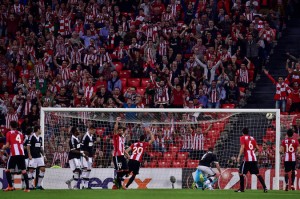 Athletic Bilbao’s Raúl García (22) after his team scored in a 5-1 victory over Partizan Belgrade. All of Athletic’s players have Basque ties. Credit Alvaro Barrientos/Associated Press
Athletic Bilbao’s Raúl García (22) after his team scored in a 5-1 victory over Partizan Belgrade. All of Athletic’s players have Basque ties. Credit Alvaro Barrientos/Associated Press
Football: ‘Unknown’ Beckham kicks off UNICEF tour in PNG
David Beckham has delighted Papua New Guinean villagers by playing in an exhibition match as part of a global charity tour, although the Pacific nation’s sports minister admitted “a lot of them don’t know who this guy is”. The football legend and former England captain travelled to Mount Hagen in the Western Highlands province to kick off a seven-nation trip, taking part in a series of games to raise funds and awareness for the United Nations children agency UNICEF. Sports Minister Justin Tkatchenko told The National newspaper he was humbled PNG was the first port of call for the 40-year-old superstar, one year before his nation hosts the FIFA U-20 Women’s World Cup. But he added to the Australian Broadcasting Corporation that some of the villagers playing with Beckham would not be aware who he is. “Two local teams from two different villagers here in Mount Hagen will be playing with him,” Tkatchenko told the ABC. “A lot of them don’t know who this guy is and how famous he is. “But those who have access to social media and that play soccer and have the love for the sport are just over the moon.”
http://watch.peace-sport.org/football-unknown-beckham-kicks-off-unicef-tour-in-png/
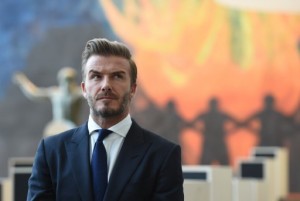 How 13-year-old Barak Price became an inspiration for the Spartans
How 13-year-old Barak Price became an inspiration for the Spartans
Barak is the mayor of the players’ families’ tailgate at each home game. He plays practical jokes on the adults and organizes two-hand touch games with whatever kids happen to be around. He’ll tap an assistant coach on the shoulder after the game and let him know Josiah needs to be getting more targets. He’ll run up to give NFL first-round draft picks a high-five, only to pull it away and laugh with them when they whiff. “A lot of people who have challenges have compensating mechanisms,” says Tim, Barak’s father. “For him it’s just his dynamic personality. It’s amazing the way he interacts with people.” The Prices usually arrive in East Lansing on Friday night before home games and stay in Josiah’s apartment. Barak plays video games with Matt Costello, Josiah’s roommate and a member of the Spartans basketball team that went to the Final Four in the spring. They stop by the team’s hotel, where Barak will say hello to his brother and flip through a few YouTube videos with Connor Cook on the star quarterback’s cell phone.
http://espn.go.com/college-football/story/_/id/14057178/josiah-price-michigan-state-spartans-draw-inspiration-13-year-old-barak-price?ex_cid=espnfb
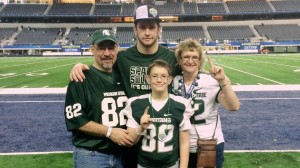 Barak Price (front with dad, Tim, on left, Josiah in back, and mom, Mary, on right) connects with the Spartans. “He just loves football, loves Michigan State and is always so happy.” said QB Connor Cook. “When you see a kid like that, he makes you happy.” Courtesy of Price family
Barak Price (front with dad, Tim, on left, Josiah in back, and mom, Mary, on right) connects with the Spartans. “He just loves football, loves Michigan State and is always so happy.” said QB Connor Cook. “When you see a kid like that, he makes you happy.” Courtesy of Price family
A Reservist Answers His Country’s Call
In 2004, I graduated from Georgetown on the Dean’s List and for years after leaving school, I found that something was lacking in my life—a community of similar team-driven minds and spirits. Then, in November of 2012, I went to Jacksonville, Fla. to visit the USS Bataan, a massive assault ship that carried the first crew to arrive in New Orleans in response to Hurricane Katrina, the same crew that provides security operations for the 5th Fleet in the Middle East. Incredibly, Georgetown was playing its season opener on the ship that day, an amazing thing to watch. The energy aboard the ship was tremendous and not just because of the game. I felt something much bigger. And after spending some time with the crew it dawned on me that I could play bigger, too. When a Navy Captain turned to me and said, “We would like to have you on our team,” I soon realized that I could find the team spirit I had been searching for.
http://parade.com/435671/parade/a-veteran-answers-his-countrys-call/
Uniting Glasgow communities through football
United Glasgow FC (UGFC) was set up as a means to get players from all walks of life involved in football, when it otherwise wouldn’t be possible due to lack of insurance, money or equipment. Since its inception in 2011, the organisation has grown to include 11, seven, and five-a-side men’s teams, and a more recently formed women’s team. All of them compete in various amateur leagues in Scotland. Collectively, the teams boast around 120 players between them. Over the years, UGFC have seen players join from 55 different countries including Sudan, Somalia and Syria. Committee member Alan White founded the team to combat the isolation often felt by refugees as they arrived in Glasgow without family, friends, or a strong grasp on the language. He said: “We felt that we could provide access to sport as a means of helping to improve their physical and mental health.
http://www.bbc.com/news/uk-scotland-glasgow-west-34732796
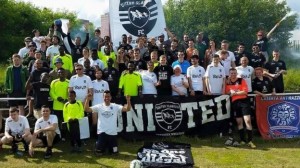 Toward Basic Rights for College Athletes
Toward Basic Rights for College Athletes
A strike by the University of Missouri’s football team brought down the school’s president. Could similar tactics be used to get campus-sports stars across the country paid?…Several forces could combine to create needed change. Ironically, the NCAA could come apart in ugly fights over skewed largesse. College players themselves, following the breakthrough example at Missouri, might devise symbolic protests. The courts, or Congress, eventually could confront the NCAA’s teetering hegemony. And colleges could set aside their self-interested bromides to launch a free-ranging inquiry on the relationship between education and the sports phenomenon on campus. No one has proved how or whether those two worlds can be made compatible, but intellectual honesty could light a better path.
http://www.theatlantic.com/business/archive/2015/11/ncaa-taylor-branch/415389/
From The Aegean Sea to Berlin’s Pools: The Story of 2 Syrian Swimmers
The Mardini sisters eventually left Damascus in early August, joining a fresh wave of Syrians who had given up hope of seeing the conflict end soon. The sisters traveled to Lebanon, then Turkey, where they paid smugglers to take them to Greece. Turkish coastguards drove their boat back on the first attempt. The second time they boarded a small inflatable dinghy at dusk. Within a half hour it was taking on water, hopelessly overloaded with people, most of whom couldn’t swim. As evening winds churned up the Aegean Sea, all bags were thrown overboard to give the small boat a chance to stay afloat. When that wasn’t enough, Ysra, Sarah and three others who were also strong swimmers jumped into the water in order to give the boat more buoyancy. “I was not afraid of dying, because if anything happened I could swim to arrive at the island. But the problem was that I had 20 persons with me,” said Sarah. “In Syria I worked in a swimming pool to watch people not drowning, so if I let anyone drown or die I would not forgive myself.”
http://www.huffingtonpost.com/entry/syria-refugee-swimmers-mardini-sisters_564360a2e4b06037734723b0?utm_hp_ref=sports&ir=Sports§ion=sports
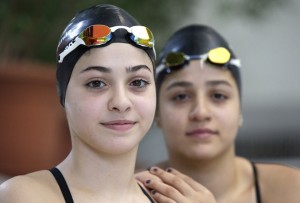 Sarah and Ysra Mardini, two sisters from Syria, have found a new home in Berlin’s pools after swimming for their lives to find refuge in Europe. Michael Sohn/Associated Press
Sarah and Ysra Mardini, two sisters from Syria, have found a new home in Berlin’s pools after swimming for their lives to find refuge in Europe. Michael Sohn/Associated Press
|


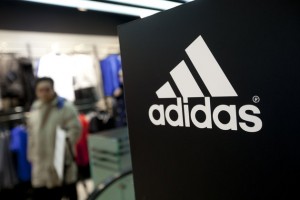
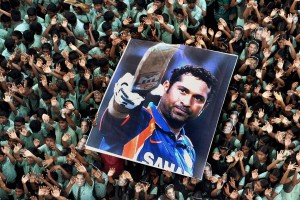
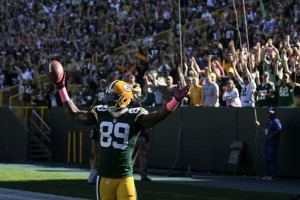
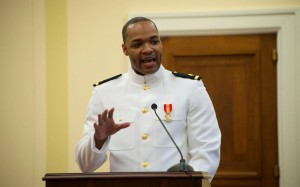
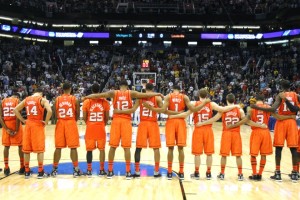

Recent Comments